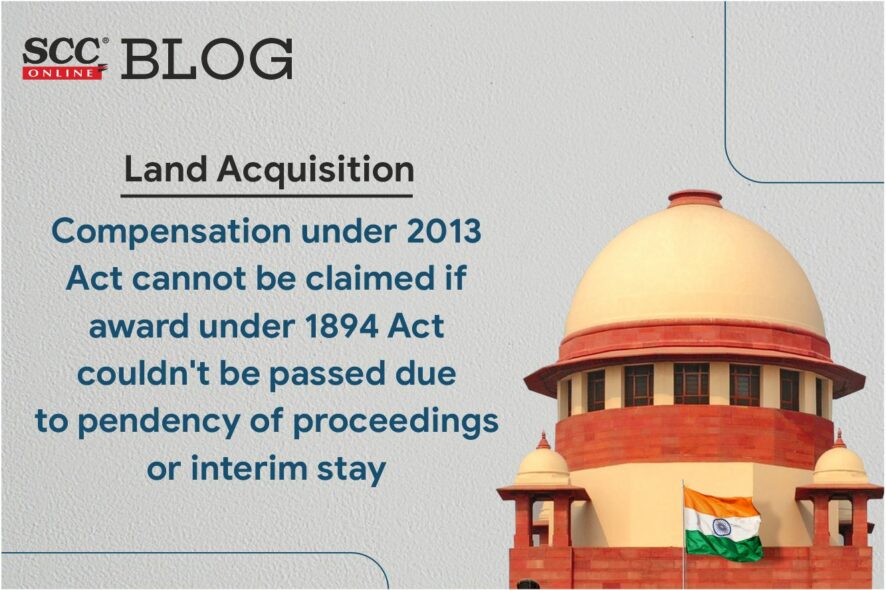Supreme Court: The bench of MR Shah* and BV Nagarathna, JJ has held that in a case where on the date of commencement of Right to Fair Compensation and Transparency in Land Acquisition, Rehabilitation and Resettlement Act, 2013, no award has been declared under Section 11 of the Act, 1894, due to the pendency of any proceedings and/or the interim stay granted by the Court, such landowners shall not be entitled to the compensation under Section 24(1) of the Act, 2013 and they shall be entitled to the compensation only under the Act, 1894.
It was argued before the Court that there is no express provision in Section 24, that excludes the period during which any interim order was operative, preventing the State from making an award. The Court, however, rejected the contention and held that preventing the State from taking the possession of acquired land or from giving effect to the award, in a particular case or cases, cannot result in the inclusion of such period or periods for the purpose of reckoning the period of five years.
It cannot be disputed that there shall be a very huge difference between the quantum of compensation payable under the Act, 1894 and the compensation payable under the Act, 2013. It cannot be said that there was any inaction on the part of the Authority in not declaring the award because of the interim order passed by the Court.
“Therefore, should the State and the Public Exchequer be made to suffer when there is no inaction on the part of the Authority in declaring the Award? The intention of the Parliament while enacting Section 24(1) of the Act, 2013 cannot be to give benefit to a litigant, who has obtained a stay order and because of that the award could not be declared and thereafter the litigant may be awarded the compensation as per Act, 2013. It may even result in discrimination between the landowners, whose lands have been acquired under the same notification.”
Stating that no party could take advantage of a litigation, the Court held that the principle of restitution is a statutory recognition of the rule of justice, equity and fair play. The court has inherent jurisdiction to order restitution so as to do complete justice. This is also on the principle that an unsuccessful litigant who had the benefit of an interim order in his favour cannot encash or take advantage of the same on the enforcement of the Act, 2013 by initially stalling the acquisition process and later seeking a higher compensation under the provisions of Act, 2013.
The Court, hence, observed that
“If at the instance of a landowner, who has challenged the acquisition, an interim order has been passed by a Court is successful then the proceeding of acquisition or the acquisition notification would be quashed. Then there would be no occasion to determine any compensation. But on the other hand, if a landowner, who has the benefit of an interim order in his favour whilst a challenge is made to the acquisition, is unsuccessful, he cannot then contend that he must be paid compensation under the provision of the Act, 2013 on its enforcement, whereas a landowner, who did not have the benefit of any interim order is paid compensation determined under the provisions of the Act, 1894, which is lesser than what would be computed under the Act, 2013.”
[Faizabad-Ayodhya Development Authority v. Dr. Rajesh Kumar Pandey, 2022 SCC OnLine SC 679, decided on 20.05.2022]
*Judgment by: Justice MR Shah






